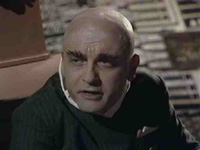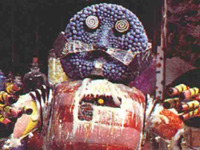Satires on taxation, global capitalism and Section 28 aren’t perhaps the usual fare of television aimed at children, but, produced as it was by the BBC’s drama department, Doctor Who often aimed squarely at the family audience, ensuring that there was a something in its stories to appeal to adults while the kids were hiding behind the sofa.
As part of my exceptionally slow progress through all the Doctor Who ever made, I recently reached The Sun Makers, a Tom Baker story from 1977 in which political satire is pushed front and centre – arguably at the expense of younger audiences.
The central conceit is relatively simple: the Doctor and Leela arrive on Pluto, where what’s left of the human race are living, enslaved by compulsory work for the Company and punitive tax rates. The Doctor’s task within four episodes is to overthrow the Company and free the people.
 It’s mostly entertaining, although much of it must have been lost on children. The Company is headed by The Collector – the only monster in the story, and not especially monstrous. He is protected by his “Inner Retinue” and answered to by the Gatherers. In between characters running round corridors, various puns in the script reinforce its themes.
It’s mostly entertaining, although much of it must have been lost on children. The Company is headed by The Collector – the only monster in the story, and not especially monstrous. He is protected by his “Inner Retinue” and answered to by the Gatherers. In between characters running round corridors, various puns in the script reinforce its themes.
The trouble is that its themes are hazy and its satire not especially sharp. Enslavement by burdensome taxation appears to be the central concept, but too many of the script’s barbs miss the target or deliberately aim elsewhere. At the beginning of the story we meet Citizen Cordo who is bankrupted by the charge for his father’s funeral – but this is an example of the evils of the Company (or of some companies) and nothing to do with tax.
The Collector is obsessed with raising money – raging capitalism – but demands this as taxation from the population. So is author Robert Holmes criticising governments for taking too much from their citizens (“He can’t make ends meet – probably too many economists in the government”), or companies that bleed resources dry (“Grinding oppression of the masses is the only policy that pays dividends”)?
And while the Company have enslaved the human race, they also saved them, carrying them from a dying Earth to a Pluto made suitable for them to live on. With the Company overthrown and the workers no longer working, the artificial suns keeping Pluto alive will go out. The Doctor casually warns the humans that they have a relatively short time to get back to Earth before happily abandoning them!
The viewer is left sure that The Sun Makers intended to have a message, but, beyond a loose critique of authoritanism generally, its lack of focus leaves the target of its satire unclear.
It’s not everyday the Doctor overthrows a government and so after watching the Doctor free the people of Pluto I popped on the DVD of 1988’s The Happiness Patrol to see Sylvester McCoy’s Doctor doing the same on the human colony of Terra Alpha. Some of this story’s satire is, by necessity, less obvious than in The Sun Makers, but its targets are better defined and on occasions attacked expicitly.
Both stories open with a colonist walking down a corridor (albeit that The Happiness Patrol‘s corridor is supposed to be a street). But where the incidental music in The Sun Makers is run-of-the-mill 1970s Dudley Simpson almost there for the sake of it, the soundtrack that accompanies Daphne S, inspired by the blues, immediately sets the tone for the story.
Daphne S doesn’t last long – she’s a “killjoy” and is promptly executed by the Happiness Patrol of the title. As Matt Jones argued in the fanzine article “Tory Alpha” (reprinted in the collection Licence Denied), there is a relatively simple interpretation of the story that makes its meaning very apparent: the Happiness Patrol, responsible for checking that everyone is “happy” – that everyone is conforming to the expected norm – are “the Heterosexual Patrol”, and Daphne S doesn’t conform at all.
 There are other aspects of the story – the notorious, Bertie Bassett-esque Kandy Man and his camp creator Gilbert M, the aboriginal Pipe People, forced into the tunnels under the city – but this core conceit holds up well. The Happiness Patrol themselves are, by definition, authoritarian and indulge in their own Orwellian double-speak, for example about the city’s so-called “waiting zone”: “This isn’t a prison… but cross that line and you’re a dead man.”
There are other aspects of the story – the notorious, Bertie Bassett-esque Kandy Man and his camp creator Gilbert M, the aboriginal Pipe People, forced into the tunnels under the city – but this core conceit holds up well. The Happiness Patrol themselves are, by definition, authoritarian and indulge in their own Orwellian double-speak, for example about the city’s so-called “waiting zone”: “This isn’t a prison… but cross that line and you’re a dead man.”
At the head of it all is Helen A. She has the laudable aim of a happy population – but when she decides that her people aren’t happy enough, she opts for fear and enforced cheer (“I want to see those teeth!”). While she was written as a representation of Thatcher – she uses their unhappiness as an excuse to clamp down on workers complaining about factory conditions – it’s an attitude entirely in keeping with Gordon Brown and New Labour’s own brand of authoritarianism: if you’re not doing what the state expects of you, there’s something wrong with you (and never something wrong with the expectation). On Terra Alpha, you have rights and responsibilities: the right to be happy, and the responsibility to be happy…
Of course, no vicious organisation is without its hypocrisies and so the Happiness Patrol themselves, despite smiling regularly and declaring their happiness (“I’m glad you’re happy”/”I’m happy you’re glad”), rarely show any evidence of it. Susan Q gets booted out and arrested after deciding she can’t go on with the pretence having woken up one morning and realised she wasn’t “happy” at all. A couple of male snipers grumpily complain that the women in the Patrol get the best weapons. Helen A’s consort Joseph C leaves her for Gilbert M, and Helen A herself can’t maintain her happy outlook when she finds her beloved pet Fifi dying in the street.
The story has its failings – the lack of location filming makes the “exteriors” seem rather cheap and the use of a studio-bound go-kart rather absurd. But to some extent it can even get away with this cheapness as the Doctor’s companion Ace complains that the whole place seems tacky and fake.
There are several targets of The Happiness Patrol‘s satire – authoritarianism, conformity, homophobia and, briefly, colonialism – but they reinforce each other and the story hits its targets.
Its sexuality allegory is relatively subtle, hinted at in dialogue including Priscilla P’s “I am who I am” and Helen A’s dreadful joke (“Did you hear about the killjoy who won an outing with the Happiness Patrol?”), although the fact that everyone wears pink could be intended as a clue too. But the anti-authoritarian streak is front and centre as the Doctor explains to Helen A at the end why her approach was doomed to fail.
That makes The Happiness Patrol one of Doctor Who‘s most liberal stories, and the series’ best attempt at political satire.


I think the point Holmes is making is that, if the ultra-capitalists get their way and sweep away every vestige government, they’ll simply be freed-up to do all the things they accuse the government of doing, and much worse. It was written as Thatcher was getting going in Opposition and as the post-war consensus was breaking down – and now, some three decades later, we do indeed have taxes going straight to pay the inflated dividends of private companies. I feel it accurately illustrates that, in stark contrast to stated promises of liberty, Thatcherism/neo-liberalism and anarcho-capitalism ultimately deliver slavery.
If you squint every-so-slightly, the Collector is a dead ringer for Vince Cable.